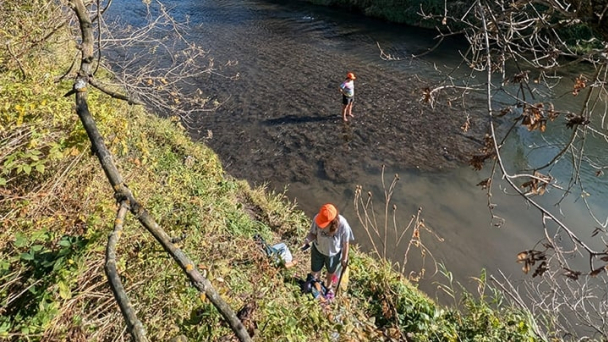May 14, 2025 | 10:08 GMT +7
May 14, 2025 | 10:08 GMT +7
Hotline: 0913.378.918
May 14, 2025 | 10:08 GMT +7
Hotline: 0913.378.918

Veterinarian Helen Errington highlights 6 areas of risk: ventilation, injurious feather-pecking, respiratory diseases, smothering, gut health and parasites. Photo: Bert Jansen.
The AIPZ does not include national housing measures, but Defra has now introduced them in York, North Yorkshire, Shropshire, East Riding of Yorkshire, Kingston upon Hull, Lincolnshire, Norfolk and Suffolk.
The National Farmers’ Union has welcomed the action by the government and vets have stressed the need for tight biosecurity.
Helen Errington, from St David’s veterinary practice, said it is a legal requirement to have good biosecurity in place under a housing order and there should be no non-essential visitors coming onto your site. Having regularly replenished foot dips made up to the correct concentration is essential and the disinfectants used must be those recommended on the Defra list.
Errington said producers should make themselves familiar with the clinical signs of bird flu and to contact their vets should they have any concerns regarding the health and welfare of their birds, or if they suspect avian influenza.
According to Errington, there are 6 key areas of risk:
Ventilation
This can be a problem in the winter months when the pop-holes are closed, especially in naturally-ventilated buildings, which can adversely affect litter quality. Ventilation systems can be adjusted in automatically-vented buildings to prevent deterioration in litter quality. The ventilation company should be contacted for advice if required. Badly capped litter should be removed from the house and the bedding material replenished.
Injurious feather-pecking
This could begin as a result of the stress of being kept indoors, and once this behaviour is established it can be very difficult to control. Reducing the lux level of lighting within legal levels can be a useful tool in calming the birds and preventing bullying. Also, adequate enrichment should always be in place, especially of the destructible type such as alfalfa bales and pecking blocks. Errington recommends PECKstone or Well-Bird pecking blocks. In addition, grit given at 7g/bird/week sprinkled on the scratch area keeps the birds occupied and can also help keep litter friable as the birds scratch about to find the particles.
Common respiratory diseases
Keeping the hens housed increases infection pressure for diseases such as Infectious Bronchitis and Mycoplasma and can exacerbate the clinical signs and the spread of disease among the birds. The majority of flocks in the UK are vaccinated with live Infectious Bronchitis vaccines in lay and this should continue. If the flock is vaccinated, then Errington advises that vaccinations continue during any housing order, administering it by either spray application, or via the drinking water.
Smothering
Flocks should be monitored around the usual times of pop-hole opening and crowds of birds broken up by walking the scratch area. The placement of ramps or other objects which stop hens crowding in certain areas can also help prevent this.
Pressure on gut health
Your chickens’ gut is the engine of your birds – without optimal health, birds cannot extract the vital ingredients needed to fight off diseases, keep general body functions going or produce high-quality eggs. Using nutraceutical products such as ABC pH can help reduce detrimental bacterial load.
Eggshell quality issues can be exacerbated during enforced housing periods, especially if the birds are stressed about being kept in. For older flocks, products such as 50 Weeks Plus are specifically designed to support hens in the second half of the laying period and will reduce the risk of increasing shell quality issues that may occur with birds that are under increased stress. Herbivit Plus is also a great supplement for younger birds and helps with weight gain in recently-placed pullets.
Parasites
Finally, it is also important that you continue to monitor any worm and parasite issues during the housing period. Worm Egg Count testing, as well as necessary worming, should continue during this time. Birds can still succumb to worm infestations even when indoors. If birds are being kept inside then it is easier to dose wormer through the drinking water as this is their only water supply, and there is no risk of them consuming non-medicated water from other sources. Discuss what product would best suit your system with your local vet.
Red mite is also another problem to keep an eye on as increases in house temperatures may occur when the pop-holes are closed, which will subsequently encourage more mite activity and reproduction than we would usually see in the winter months. If mites do become a problem for your birds, get in touch with your local veterinary team who will be able to advise on which mite solutions and products would work best for your farm.
(Poultryworld)

(VAN) India is concerned about its food security and the livelihoods of its farmers if more US food imports are allowed.

(VAN) FAO's Director-General emphasises the need to work together to transform agrifood systems.

(VAN) Europe is facing its worst outbreak of foot-and-mouth since the start of the century.

(VAN) The central authorities, in early April, released a 10-year plan for rural vitalization.

(VAN) Viterra marked a significant milestone in its carbon measurement program in Argentina, called Ígaris, reaching 1 million soybean hectares measured.

(VAN) Minnesota study adds to growing evidence of human-accelerated erosion, which could jeopardize agriculture.

(VAN) QU Dongyu addresses International Conference of the Global Mountain Dialogue for Sustainable Development in Kyrgyzstan.